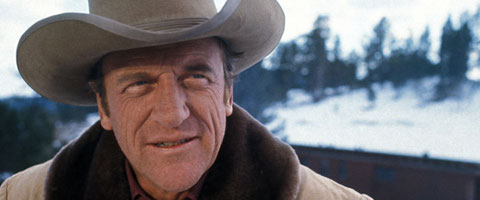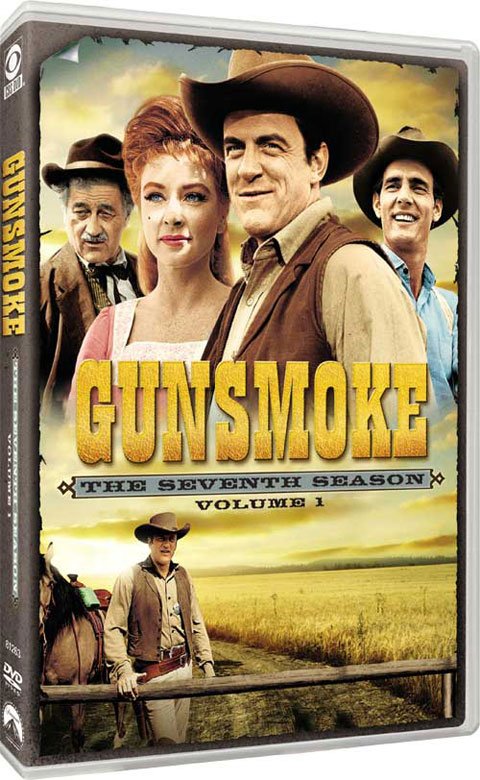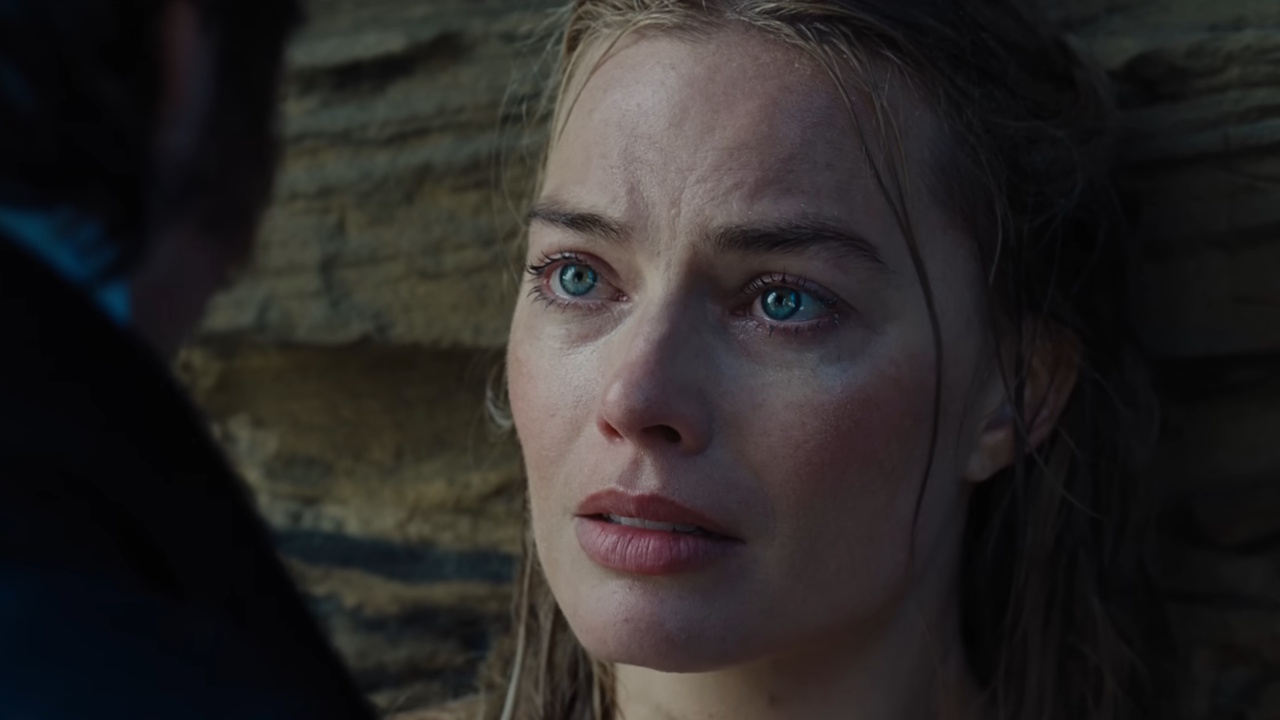Gunsmoke: The Seventh Season, Vol. 1 [DVD Review]

Your Daily Blend of Entertainment News
You are now subscribed
Your newsletter sign-up was successful
The Western is an endangered genre. Sure, every few years an auteurist director reboots a classic like True Grit, or a studio tries to profit off of combining cowboys with aliens, but that breed of entertainment no longer captivates America. The opposite was true at the mid-century mark: when Gunsmoke first broadcast in 1955, it was one of literally dozens of shows set in the Old West. Watching the series today is a reminder not only of the show’s merits, but exactly how different that era and its television are from our own.
Gunsmoke is the longest running drama in television history, airing from 1955-1975. In it, U.S. Marshal Matt Dillon (James Arness) keeps watch over the troubled town of Dodge City, helped by his incompetent deputy Chester (Dennis Weaver), the scruffy Doc Adams (Milburn Stone), and Miss Kitty (Amanda Blake), the clever and attractive saloon owner. For five of its first six seasons, the half-hour drama was the number one show on television, before switching to an hour-long format in 1961--which killed its ratings, a blow recorded for posterity here on DVD.
This collection marks a crucial turning point in the series’ history, not just in its popularity, but also in the program’s composition. It’s easy to see why so much of the audience lost interest in the new format: when each story lasted half an hour, the problems in Dodge could only get so complicated before the climatic confrontation (i.e. shootout) and conclusion. The new structure allows for more involved plotlines that use twice or three times as much dialogue. This isn’t helped by the unsteady pace of these early episodes, which linger over long, non-diegetic jokes and uninteresting stories. For fans who originally tuned in for twenty-odd minutes of action and villainy, these ponderous new installments probably held little interest.
Despite its growing pains, the show’s expansion is in some ways an improvement, primarily because it allows the show to delve into a cast of surprisingly complex characters. The villains are rarely 100% bad, but are drawn into trouble by love, greed, or folly. In “Perce,” an outlaw successfully goes straight until the town’s prejudices and his mercenary sweetheart push him to engineer his own demise. In “Milly,” a girl tries to escape her abusive father only to become an auger of trouble herself. Even the regulars also come under the microscope: Matt Dillon, who usually waits in the wings until the others sort (aka shoot) out their problems, is taken to task in “Long, Long Trail.” A woman he is traveling with becomes fed up with his unbreakable equilibrium, asking, “Doesn’t anything ever bother you? Don’t you feel?”
No matter what their flaws or offenses, the program rarely condemns its characters outright. When a cavalry officer shoots the Indian lover of a captured white woman, he attempts a haltingly apology, only for her to reply, “How can you apologize for being what you are?” Miss Kitty appears at one point to have an illegitimate child, yet no one thinks the less of her for it.
Unlike today, where even shows as unchanging as CSI are expected to have some character development, here there is no progress whatever. Matt and Kitty barely hint at a possible attraction, and both Doc and Chester remain perpetually alone and idiosyncratic. The season is therefore sustained not by its plot arcs, but by the strength of Arness and Blake’s performances. Arness is not exactly a demonstrative actor, but his character’s goodhearted constancy lends stability to the show’s churning melodrama. And while Kitty many not have much screen time – indeed, sometimes whole episodes go by without a visit to her saloon – her wry banter and muted smolder steal every scene she’s in.
The most sobering reminder of Gunsmoke’s age is its antiquated perception of gender. Female characters are allowed a decent amount of agency, often living alone and standing up for themselves. Still, an upsetting number of the episodes end with a woman crying over a dead body, either because she wronged him herself, or because she was wronged by him. One can usually predict whether she’s the victim or the aggressor by how pretty the actress is. The episode then ends with the lonely woman slowly walking into the distance, regretting her choices. It doesn’t do any good to rail at a show for reflecting the values of its era, but that doesn’t make it any easier to watch.
Your Daily Blend of Entertainment News
There have already been multiple director’s and anniversary editions of Gunsmoke; this complete edition is therefore aimed at the TV history junkies, and has been packaged accordingly. The set contains the first seventeen of Season 7’s 34 episodes, with the original episode previews and “sponsor materials” as special features. The extras aren’t much to speak of: the “sponsor materials” are two 30-second ads that would have played after the title card, and the previews are self-explanatory. If you’re looking for an insider’s look at the series, complete with reminiscent interviews and in-depth featurettes, you’ll have to look elsewhere.
Gunsmoke is the product of a largely forgotten era. Sure, people will remember the show if you ask them about it. But unlike The Honeymooners, I Love Lucy, or
[[ the i mary moore show ]] <="" tyler="">, the series has not changed the face of television in a way that still remains relevant today. In some ways it is like its own Dodge City: it was the hottest thing around in its day, but little now remains but a ghost town.
?Rating:

?
?
Length:14:19
Distributor:CBS DVD/ Paramount
Release Date:December 11, 2012
Starring:James Arness, Amanda Blake, Dennis Weaver
Created by: Charles Marquis Warren

